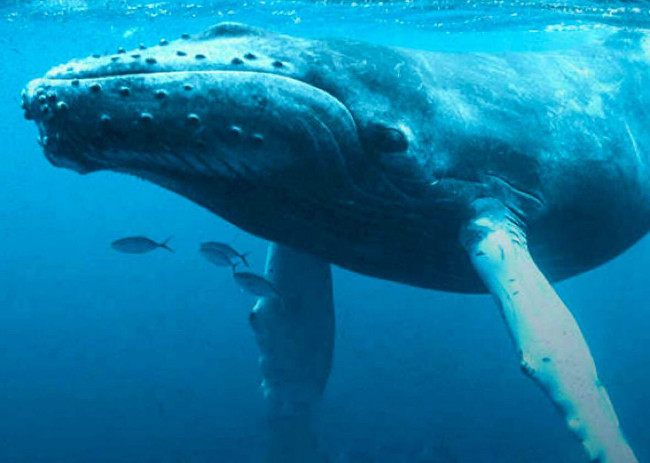Revealing secrets to help whales dive 'super good'
Scientists have recently discovered a mechanism to limit whale disease to the common diseases of divers because of deep diving.
This is the secret to whales and many other aquatic mammals that live well in the water.
What is emphysema?

Although mammals, whales have special mechanisms suitable for underwater life - (Photo: Getty Images).
According to the Science Daily, compressed air or hypotension usually occurs in some mammals when in a sudden pressure change environment . For example, divers who are deep under water with high pressure immediately climb up to the ground - where the pressure is lower.
In high pressure environments, nitrogen gas usually accumulates in blood and tissue in the form of small bubbles. When floating slowly to the surface of the water, nitrogen gas can return to the lungs and be discharged.
Conversely, when the water floats too quickly, the change in water pressure creates a sudden pressure difference between nitrogen in and out of the body. This causes the air bubbles to expand, similarly when opening the bottle of fresh water to inflate a lot of carbon dioxide.
Expanded air bubbles can clog blood vessels, making it difficult for oxygen to circulate the body.
In addition, when this phenomenon occurs in the bone will appear pores that cause bone damage.
Special construction supports whales
The Independent reports that some whales can dive as deep as 1,500m to feed. The question of whether or not the depth of the whale has the disease is attractive to scientists for many years.
In 2007, Michael Moore and Greg Early of Woods Hole Oceanographic Institute (USA) found evidence of compressed air disease in the bones of some modern sperm whales or even 111 year olds.
Michael Moore then examined more of the stranded whales and found many air bubbles inside their tissues. Moore concluded that aquatic mammals may also suffer from compressed air disease .

The whale's lungs have a special mechanism that helps them "stay healthy" underwater - (Photo: The Wired).
Recently, however, scientists from Woods Hole Oceanographic Institute and the Oceanographic Foundation in Spain claim that the majority of aquatic mammals can avoid this disease by a special mechanism.
The team conducted CT scans of whales, seals and domestic pigs in a large pressure compression chamber and found that the lungs of terrestrial and aquatic animals were very different.
Lungs of aquatic mammals are divided into two distinct areas : gas tightening zone and gas collapse zone.
In high pressure environments, their blood mainly moves through the collapsed area. According to lead researcher Dr. Daniel Garcia-Parraga, this mechanism minimizes the amount of nitrogen taken by whales and other aquatic mammals. This means limiting the risk of emphysema.
However, Dr. Garcia-Parraga said today many of the human activities on the sea create sound waves that interferes with the mechanism of two lung areas of these mammals. As a result, more blood transports through the gas-tight zone increases the amount of nitrogen present in the blood and tissues.

Marine mammals are severely affected by human sound waves - (Photo: Marine Insight).
Why do whales dive deep without "fainting"?
On Live Science, Terrie Williams, Ph.D. in ecology and evolutionary biology at the University of Santa Cruz (USA), said the secret to helping animals on the sea to maintain oxygen is due to the special oxygen-containing proteins in Brain.
Williams and colleagues focused on two proteins that only reside in brain tissue, neuroglobin and cytoglobin . They are similar to hemoglobin - a molecule that carries oxygen in the blood and operates throughout the body.
The scientists compared the levels of hemoglobin and two types of brain globin in 16 mammals, including terrestrial animals such as mountain lions, lynx, long muzzle dolphins, California sea lions, whales and fish. pig…
The results showed that the brains of marine mammals generally have more hemoglobin and globin than land animals. Scientists explain the amount of this abundant protein that helps aquatic mammals stay alive even if they dive deep without "fainting" due to lack of oxygen.
- The 'whale' is about the size of a dinosaur
- Super yacht can dive 240 meters for $ 2.3 billion
- Use Facebook, revealing secrets like playing!
- Whales cry because of aground, the action of the people makes everyone admire
- The death of old whales brings countless benefits to oceans and ecosystems
- Nearly 150 whales die on the coast of Australia
- Video: Flock of ferocious whales eating main meat
- Why are humpback whales disappearing in Hawaii?
- The oldest wheel in the UK excavated, revealing secrets 3,000 years ago
- Whales love to take pictures of fun with divers
- Vietnam successfully tested small-sized diving vessels
- 39 whales die from stranding
 Surprised: Fish that live in the dark ocean still see colors
Surprised: Fish that live in the dark ocean still see colors Japan suddenly caught the creature that caused the earthquake in the legend
Japan suddenly caught the creature that caused the earthquake in the legend A series of gray whale carcasses washed ashore on California's coast
A series of gray whale carcasses washed ashore on California's coast Compare the size of shark species in the world
Compare the size of shark species in the world